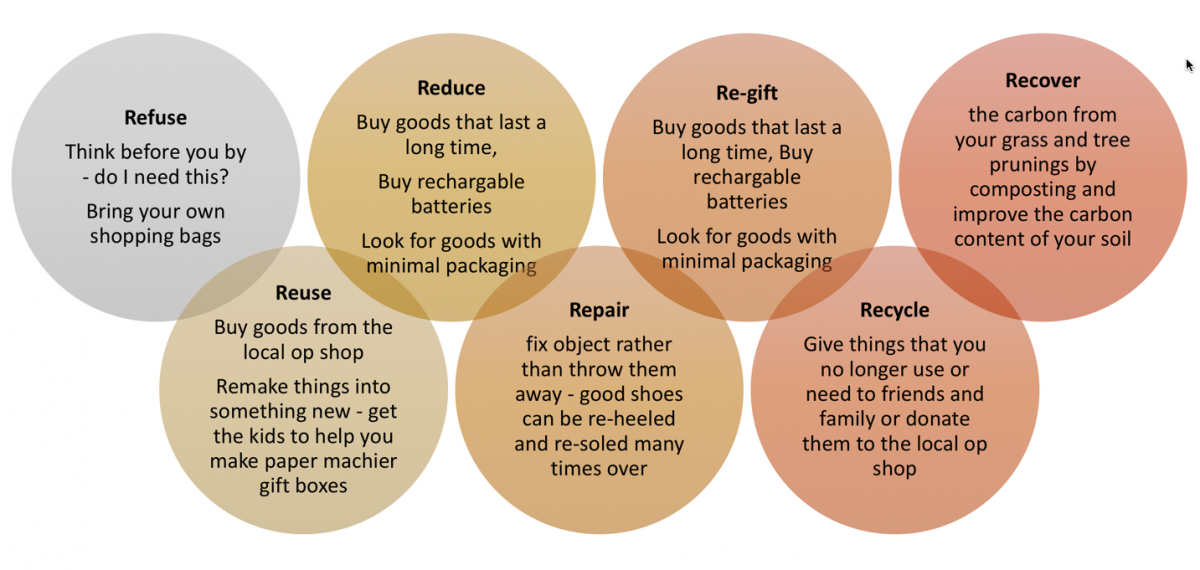Over the last 20 years, recycling has undergone nothing short of a revolution and Australians have been at the forefront.
But we get used to doing the same old things, so these 7 R’s of recycling should help you refocus and maybe even find some things you aren’t doing yet!
1. Recycle
Check out your fridge magnet or our Let’s Get It Sorted website to make sure you are recycling everything you possibly can.
2. Refuse plastic shopping bags
Take your own and if you forget one use a box – most supermarkets have plenty of them as their products come packed in them.
Every year we throw away close to 100 billion plastic bags! So if you’re looking for some solid reasons to make the switch to the reusable tote bags, offered at many grocery stores, here are a few that may change your mind.
Five reasons to refuse plastic bags
1. They are filling up the landfills
No matter how many uses you find for plastic bags, they are eventually going to end up in the landfill, where they will remain for quite a while (roughly a thousand years), taking up space, because they aren’t biodegradable.
2. They are made from non-renewable resources
Most plastic bags are made of polyurethane, a composite created from such non-renewable components as natural gas and crude oil.
3. They are harmful to animals
Once you throw plastic bags into the rubbish, you don’t have any control over where they go, and you can’t stop them from getting out into the environment where they can cause harm to whatever ecosystem they end up in.
Both land and marine animals suffer from starvation, strangulation, choking, and entanglement by plastic bags, whether because they blunder into them and become trapped or because they often eat them.
It is estimated that approximately 100,000 sea animals die each year from plastic bags and they are amongst the top five most common types of refuse found on beaches. Do you have pets? They could be in danger, as well.
4. They can be harmful to people
If you have children, you should be aware that plastic bags need to be kept away from your tots because they pose a hazard for choking and suffocation.
5. Who recycles?
Although it’s true that plastic bags can be recycled, and many markets have bins for customers to recycle their used bags, the unfortunate truth of the situation is that only about 1 percent of plastic bags are recycled worldwide.
3. Reduce your rubbish
You can do this by either avoiding generating it in the first place or finding other uses for what you were about to throw out. Here are some great tips:
- Mound used coffee grounds in a ring around garden plants to keep ants and slugs away.
- Snagged pantyhose or tights may look unsightly on the legs, but nobody will care when they are being used in the home. For starters, they make great sleeves for posters, wallpaper rolls, wrapping paper and anything else that needs to stay rolled up.
4. Reuse whatever you can
- Use a soft drink bottle to water the roots of garden plants without standing there with a hose: poke small holes in the bottom of the jug and bury it, then fill with water for slow and steady irrigation.
- Tired, broken-down, ‘fragrant’ running shoes is to send them to Nike they are turned into a raw material called Nike Grind, which is used in everything from running tracks to shoe soles to zippers.
5. Repair
Change it up - think ‘repair’ before you think ‘rubbish’!
Instead of throwing out your good shoes – take them to a boot maker and have them resoled and reheeled.
Find out if you have a local men’s shed who are involved in fixing and repairing a whole range of things.
6. Re-gift or sell
When the kids grow out of their clothes or have out grown their toys, hand them on to friends and family or take them to the op shop. You could even make some money while helping the environment by selling unwanted items on Gumtree.com or ebay.
7. Recover
Shred or chip your prunings and use them on on your garden – it will add much needed carbon to your soil and save water. Why not hire a shredder for the day – you could share the cost with a neighbour or two!

